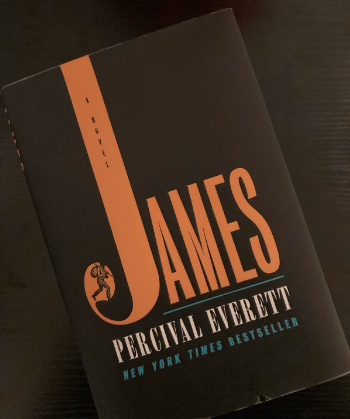Ariana Trelles-Duckett
Contributing Writer & Copy Editor
On Oct. 25, author and professor Percival Everett visited UC Santa Barbara’s (UCSB) Campbell Hall for a discussion on his recent novel “James” (2024), which was hosted by the Justice for All program through UCSB’s Arts & Lectures. “James” is a retelling of “The Adventures of Huckleberry Finn” (“Huckleberry Finn”) from the perspective of Jim, Huck’s enslaved friend who runs away with him in the original novel.
The evening began with Everett reading several novel excerpts and sharing insights on how he created his characters. In “James,” Jim introduces himself to fellow enslaved people as James, choosing that name instead of Jim, which white people call him. James, his wife, and his daughter are all owned by Miss Watson, with whom Huck lives. James escapes when he finds out that he is going to be sold. Huck later finds James after Huck decides to stage his own death and run away from home, and they start to travel together.
James’s ultimate goal is to return to his wife and daughter and travel north — a dangerous and unpredictable journey given the ever-present hostility towards enslaved people, in which James can trust few people not to turn him in.
After reading aloud pertinent sections of the book, Everett was interviewed by Dr. Daina Ramey Berry, the Dean of Humanities and Fine Arts, and Dr. Stephanie Batiste, a professor of Black studies and English at UCSB. The conversation highlighted Everett’s craft and his inspiration for writing “James.” While playing tennis one day, Everett realized that no version of “Huckleberry Finn” existed which centered on Jim’s character. He read “Huckleberry Finn” over a dozen times to research the setting, worldbuilding, and narrative — he now plans to never pick up the book again — and emphasized that Jim “needed a method of expressing the agency which he already had.” “James” doesn’t bestow an identity to James, but gives him a platform to speak for himself that Twain’s storytelling did not. Furthermore, James can read and write in the novel, and when he gets access to books, a pencil, and paper, he is able to explore the world and his positionality through literature, further empowering his agency.
Throughout the novel, James code switches between his regular speech with other enslaved people and the way in which he and other enslaved people speak to white people, which incorporates incorrect grammar and the mispronunciation of words to make the speaker seem incompetent, protecting enslaved people from harm and punishment.
One of the first scenes of the novel, which Everett read a portion of, shows James teaching a group of children how to talk to white people. They review several rules including not speaking first and not making eye contact, as well as how to speak with other enslaved people around white people through “signifying,” in which the speaker does not directly address any subject. After several successful examples and a discussion about why enslaved people speak that way to protect themselves, the children attest, “The better they feel, the safer we are.”
Dr. Berry and Dr. Batiste drew connections between the code switching in “James” and a real project in the 1930s to record the stories of formerly enslaved people throughout the South. During the Great Depression, The Works Progress Administration employed artists — all white — to visit former enslaved people in a variety of states to record their narratives about slavery, with the goal of employing workers with artistic backgrounds as well as recording American stories across the country. Everett, Dr. Berry, and Dr. Batiste highlighted how in the recordings, the interviewees speak English the same as their interviewers, emphasizing the strategies for survival of enslaved people under constant violence from white people in the United States.
The interview turned to the 1961 nonfiction book by John Howard Griffin, “Black Like Me,” another instance in history of white research on Black lives. Griffin traveled to the South and disguised himself as a Black person to understand what it was like to be Black. Everett recalled that Griffin revealed his race to a Black man, and the Black man could already discern Griffin wasn’t Black. As the conversation revolved around Griffin’s methods for researching — using himself instead of interviewing Black people — and the book’s reception, Everett highlighted how “until white Americans experience it, it doesn’t exist.”
Everett’s published work includes “The Trees” (2021), “I Am Not Sidney Poitier” (2009), and perhaps most notably “Erasure” (2001), which was adapted into the film “American Fiction” (2023) and won the Academy Award for Best Adapted Screenplay. Following the event, there was a book signing and free copies of “James,” as well as copies of his other books to purchase from Chaucer’s Bookstore.











